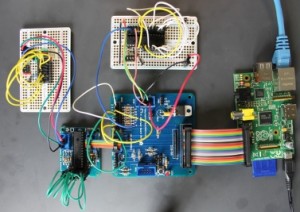Virtual Pi Wars 2020 was outstanding!
This year Pi Wars went virtual, and it was a huge success.
Mike Horne did a superb job as compère, and the Robot videos were wonderful: always informative, often amusing and of very high quality.
Over the next few days we'll have a chance to vote. It's going to be a very difficult choice!
The Teams presented creative and individual solutions, but some common themes emerged. Lots of teams made use of simulations. Some used custom software based around standard libraries; others were based on specialised open source frameworks like VTK.
Most Robots were programmed in Python, but several used Pi controllers with peripheral Arduino nanos or teensies programmed in C.
Some teams used ToF (Time of flight) sensors for distance sensing and SLAM (Simultaneous location mapping and mapping). A growing number of entrants used OpenCV or plan to use it next year.
Many Teams share their software and designs. I'm looking forward to exploring several of the projects on GitHub as I look through the videos over the next day or so.
Over 300 people watched the virtual presentation. They savoured three hours of excellent virus-free entertainment. Thanks to everyone involved, and special thanks to Mike Horne and Tim Richardson for turning that bright idea all those years ago into a wonderful, enduring institution.
Mike Horne did a superb job as compère, and the Robot videos were wonderful: always informative, often amusing and of very high quality.
Over the next few days we'll have a chance to vote. It's going to be a very difficult choice!
The Teams presented creative and individual solutions, but some common themes emerged. Lots of teams made use of simulations. Some used custom software based around standard libraries; others were based on specialised open source frameworks like VTK.
Most Robots were programmed in Python, but several used Pi controllers with peripheral Arduino nanos or teensies programmed in C.
Some teams used ToF (Time of flight) sensors for distance sensing and SLAM (Simultaneous location mapping and mapping). A growing number of entrants used OpenCV or plan to use it next year.
Many Teams share their software and designs. I'm looking forward to exploring several of the projects on GitHub as I look through the videos over the next day or so.
Over 300 people watched the virtual presentation. They savoured three hours of excellent virus-free entertainment. Thanks to everyone involved, and special thanks to Mike Horne and Tim Richardson for turning that bright idea all those years ago into a wonderful, enduring institution.



Comments
Post a Comment